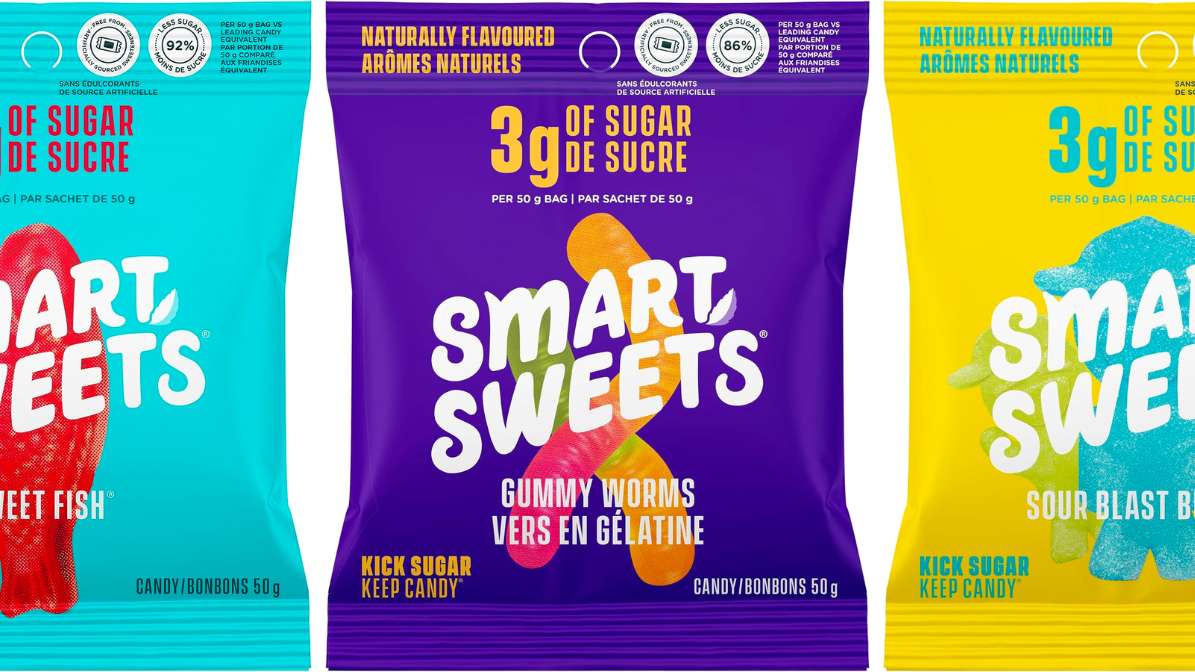This low-sugar candy is promoted as a healthier alternative to traditional candy, but are Smart Sweets actually healthy? Our expert dietitian breaks down the ingredient list and nutrition facts to help you make an informed choice at the grocery store.
About Smart Sweets
Smart sweets are low-sugar candy formulated to mimic traditional varieties such as gummy worms and peach rings.
Nutrition and Ingredient Claims
Smart Sweets are promoted as having “no artificial sweeteners”, “no added sugar”, “colored with fruit and veggie juices”.
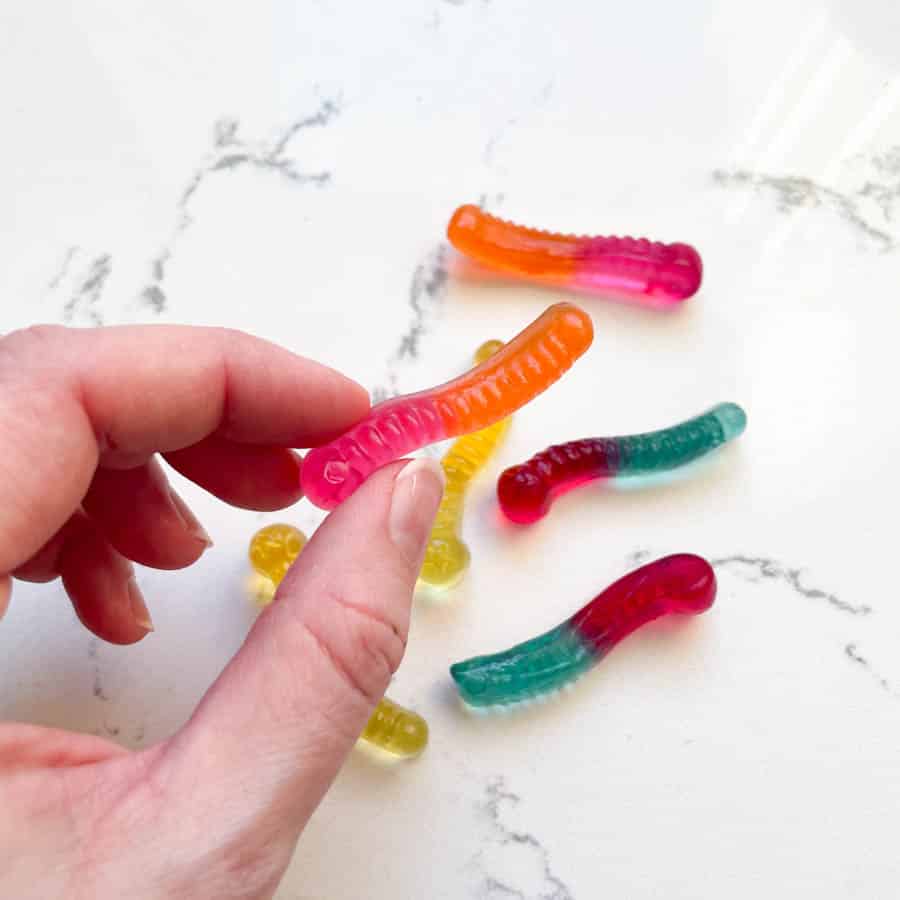
Taste & Texture
What separates Smart Sweets from other low-sugar candy on the market is flavor. Unlike sugar-free candies of the past, Smart Sweets actually taste like their sugar-containing counterparts. I have tasted many Smart Sweets flavors and I find they taste just as satisfying as traditional candy.
Smart Sweets Ingredients
Ingredients for the Gummy Worms flavor:
Isomalto-oligosaccharides (vegetable source): a non-sugar sweetener made from starch consisting of non-digestible and digestible carbohydrates. The non-digestible carbohydrates are fermented in the large intestine and are considered a prebiotic.
Allulose (American product only): Allulose is a natural sugar found in small amounts in some fruit. Since it is only naturally occurring in small quantities, it is most often manufactured from fructose for use in the food industry. When consumed, 70% of allulose is absorbed through the small intestine, and the remaining 30% is excreted. The absorbed allulose is not metabolized by the body, so it is considered a zero-calorie sweetener (0.4 calories per gram) and can act as a sugar substitute in foods. It has recently been approved for use by the FDA in foods in America but has not yet been approved for use in Canada.
Chicory root fiber (Canadian product only): a source of soluble fiber (inulin) used to increase the fiber content of food products. For more information about chicory root fiber, see our full review of Inulin here.
Soluble tapioca fiber (American product only): resistant dextrin sourced from tapioca. Generally recognized as safe in the U. S and approved for use in foods such as snacks, crackers and cereal bars.
Gelatin: responsible for adding the gummy texture to candy. Typically sourced from animal skin and tendons, though the source is not specified on the Smart Sweets label.
Malic Acid: used as a pH adjuster in foods.
Citric Acid: used as a preservative, flavor enhancer, and pH adjuster in foods.
Natural flavors: this is a blanket term for any combination of extracts from plant or animal products. Check out our blog post, What are Natural Flavors and Should you Avoid them? for more information on natural flavors.
Fruit and vegetable juice: added for color.
Coconut oil: source of saturated fats coming from the meat of a coconut.
Carnauba wax: used as an anti-caking and bulking agent in foods.
Spirulina extract: added for color.
Stevia leaf extract: a non-caloric sweetener that comes from the leaves of the plant Stevia rebaudiana Bertoni.
Priority Allergens
There are no priority allergens listed on the product package. Always check the food label for up-to-date ingredients and allergen information before consuming.
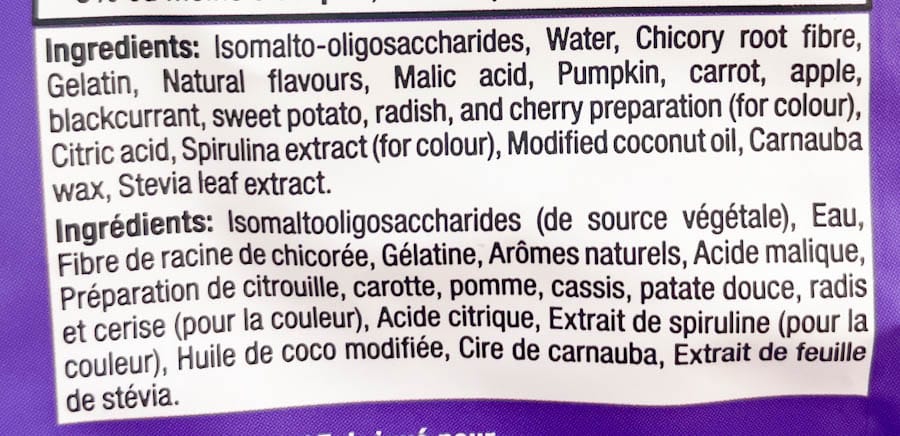
Smart Sweets Nutrition Facts
Gummy worms (American version):
Calories: 110
Fat (g): 0
Saturated fat (g): 0
Sodium (mg): 70, trace amounts found in product ingredients.
Carbohydrate (g): 36, from isomalto-oligosaccharides, allulose, and tapioca fiber
Fiber (g): 9, from tapioca fiber.
Sugar (g): 4g, trace amounts from carbohydrate sources.
Protein (g): 4g, from gelatin.
Other nutrients: Calcium 0mg, iron 0mg,
Gummy Worms (Canadian version):
Calories: 120
Fat (g): 0
Saturated fat (g): 0
Sodium (mg): 20, trace amounts found in product ingredients.
Carbohydrate (g): 36, from isomalto-oligosaccharides and chicory root fiber.
Fiber (g): 18, inulin from chicory root fiber.
Sugar (g): 3g, from isomalto-oligosaccharides.
Protein (g): 3g, from gelatin.
Other nutrients: Calcium 0mg, iron 0mg,
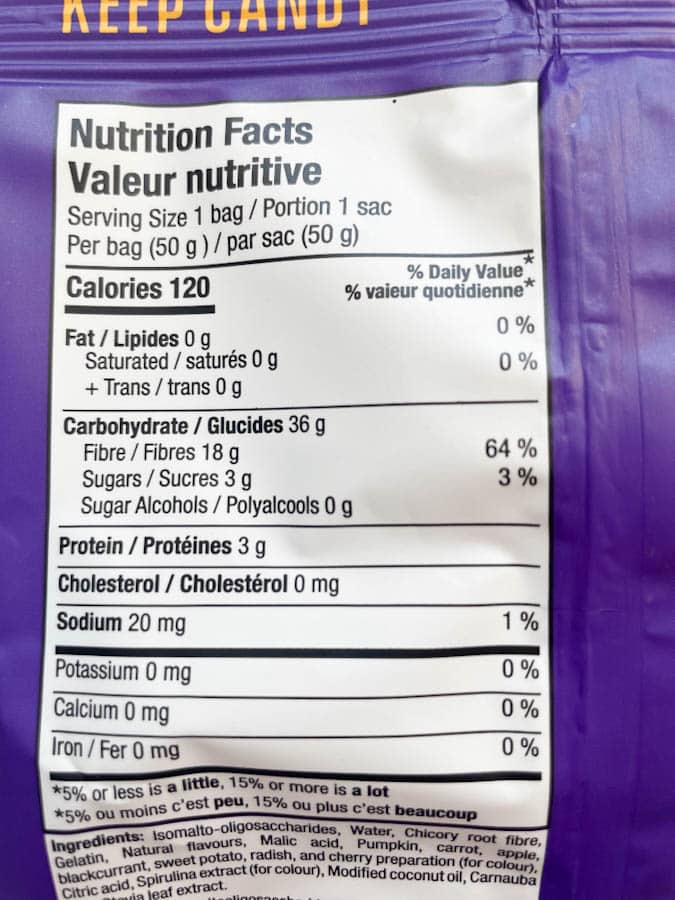
Are Smart Sweets Actually Healthy?
Low-calorie candy has been around for decades as part of the diet industry. These candies have historically contained sugar alcohols as a low-calorie sweetener, which causes a laxative effect if consumed in high amounts.
I do not typically recommend low-calorie or ‘diet’ alternatives to food, like sugar-free candy or cauliflower instead of rice. Most often, these alternatives do not taste as good as the original and are not satisfying as a replacement.
However, Smart Sweets are different from other low-sugar candies as they taste similar to their traditional counterpart. Overall, they are a great alternative for someone looking to enjoy candy without the high sugar content or artificial flavors and colors.
Nutritionally, a 50g serving of Smart Sweets contains only 2-3g of sugar compared to 28g of sugar in the same serving of traditional candy. Though they have a low sugar content, they do contain 18g (Canadian version) or 27g (American version) of net carbohydrates, which is important to note for those managing their blood sugars. Both the American and Canadian versions of Smart Sweets are high in fiber, with 9g and 18g, respectively, which may cause digestive discomfort (such as increased gas, cramping, and bloating) in those with a sensitive gut.
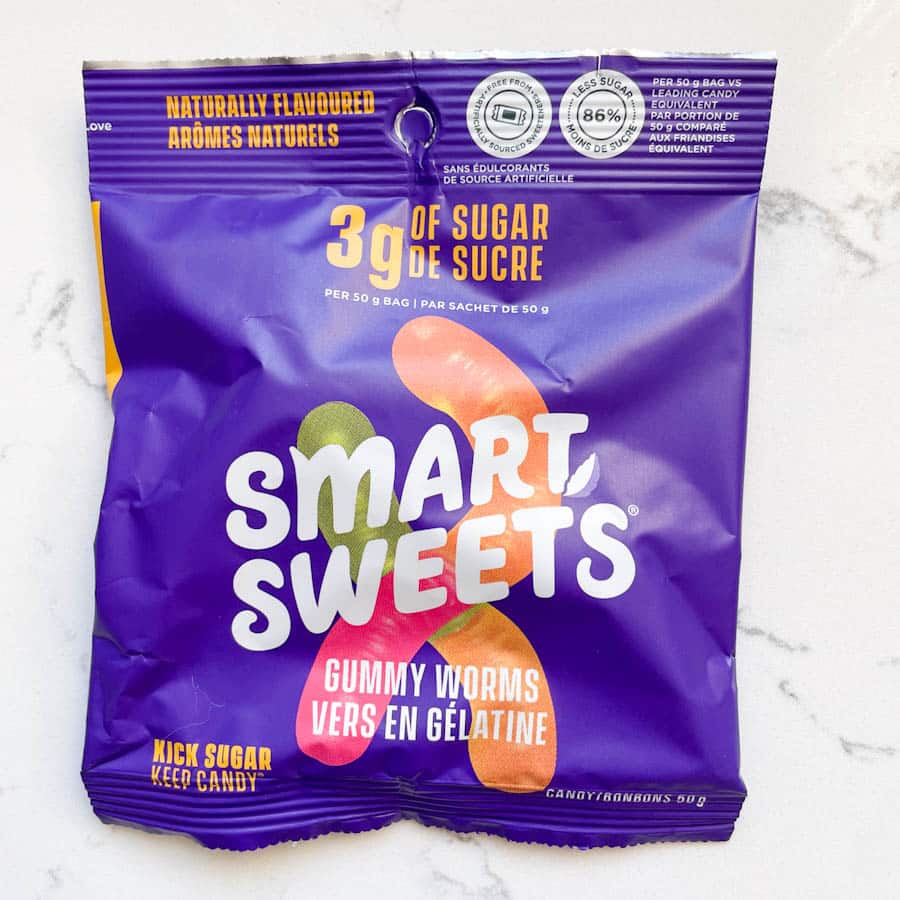
Frequently Asked Questions
Are Smart Sweets gluten-free?
Yes, Smart Sweets are gluten-free.
Are Smart Sweets keto?
Smart sweets contain 18-27g net carbohydrates per serving and are not considered keto.
Are Smart Sweets vegan?
Smart Sweets contain gelatin and may not be suitable for a vegan diet.
Are Smart Sweets good for weight loss?
Weight loss will depend on your overall dietary pattern and lifestyle, however, replacing traditional candy in your diet with smart sweets is a lower-calorie option and may help promote weight loss if traditional candy has contributed significantly to your diet in the past.
Are Smart sweets good for diabetics?
Blood sugar response to certain foods will vary depending on the person. Smart Sweets are low in sugar and high in fiber and would likely result in a more favorable blood sugar response compared to traditional candy. However, Smart Sweets are not free from carbs. They contain 18-27g of net carbohydrates per serving, which can increase blood sugar even though the candy is low sugar. Always check with your healthcare provider for the best food and snack options for your specific needs.
Related posts:
- Is Bubly Sparkling Water Good For You? Dietitian Review
- Are Quest Bars Healthy? Dietitian Review
- Is Annie’s Mac and Cheese Healthy? Dietitian Review
Sources:
- Biproduction of D-allulose: Properties, applications, purifications, and future perspectives. Comprehensive Review in Food Science and Food Safety (2021). DOI: 10.1111/1541-4337.12859.
- Research Advances of d-allulose: An Overview of Physiological Functions, Enzymatic Biotransformation Technologies, and Production Process. Foods (2021). DOI: 10.3390/foods10092186
- United States Food and Drug Administration. Guidance for Industry: The Declaration of Allulose and Calories from Allulose on Nutrition and Supplement Facts Labels (2020).
- Food and Drug Administration. GRAS Notice D-Allulose (2021).
- O’Donnell, K., & Kearsley, M. W. (2012). Sweeteners and sugar alternatives in food technology (2nd ed.). Wiley-Blackwell.
- Novel Food Information – Isomalto-oligosaccharide, Health Canada (2012).
- Determination. of GRAS Notice of Resistant Dextrin, 2021.
- L-Malic Acid, Health Canada, 2023.
- List of Permitted Preservatives, Health Canada, 2022.
- Carnauba Wax, Health Canada, 2022.

